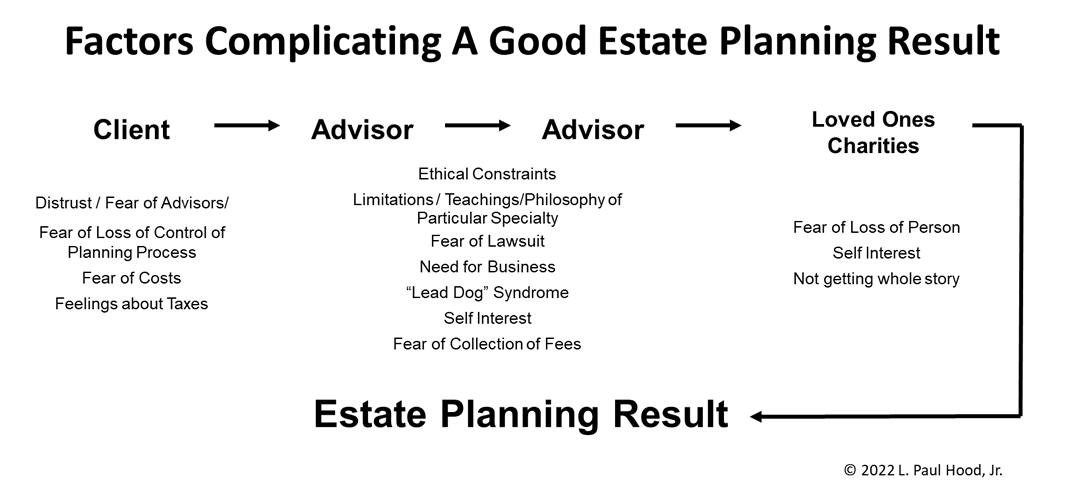Getting A Good Estate Planning Result Is Hard
Published Thursday, May 12, 2022 at: 3:06 PM EDT
At a class for professionals, L. Paul Hood, Jr., one of the nation’s leading estate planning educators of lawyers, accountants, and financial advisors, recently identified all the things that can go wrong with an estate plan. It’s a lot! For individuals facing estate plan questions, here are some important considerations.
The players involved in creating an estate plan include you, the client, of course. But you will probably need to work with two or three advisors, and they must be coordinated with each other. And then there are your beneficiaries –and those who believe themselves to be beneficiaries but are not, loved ones and charitable causes you want to support after your death. The interaction of the players creates opportunity for confusion, misunderstanding, personality conflict and the array of things that can go wrong in human interaction.
Fear, emotion, and self-interest further complicate the ability to get a good estate planning result according to Hood, who taught estate planning at several law schools for over 10 years during an almost 40-year career in estate planning. Clients often fear or don’t completely trust their advisors, fear losing control of their estate plan, or worry about the cost of getting advice.
Meanwhile, legal, tax, and financial advisors can also get in the way of a good estate plan result because of their need for business, fear of being sued for malpractice, need to compete with other advisors on your team to be the lead advisors and their technical knowledge of tax law and the psychological factors involved in estate planning.
Loved ones who you want to benefit from your estate plan could have difficulty getting over the fact you are no longer there to talk to. Or some of your heirs could be jealous of what another beneficiary inherited. And then there is a chance that you or your advisors failed to communicate the whole story about the decisions you made in your estate plan, according to Hood, author or coauthor of nine books on tax planning.
Getting a good estate planning result is hard, but at least you now know about the things that could go wrong and can try to be mindful of these factors.
Nothing contained herein is to be considered a solicitation, research material, an investment recommendation, or advice of any kind, and it is subject to change without notice. Any investments or strategies referenced herein do not take into account the investment objectives, financial situation or particular needs of any specific person. Product suitability must be independently determined for each individual investor. Tax advice always depends on your particular personal situation and preferences. You should consult the appropriate financial professional regarding your specific circumstances. The material represents an assessment of financial, economic and tax law at a specific point in time and is not intended to be a forecast of future events or a guarantee of future results. Forward-looking statements are subject to certain risks and uncertainties. Actual results, performance, or achievements may differ materially from those expressed or implied. Information is based on data gathered from what we believe are reliable sources. It is not guaranteed as to accuracy, does not purport to be complete, and is not intended to be used as a primary basis for investment decisions. This article was written by a professional financial journalist for Advisor Products and is not intended as legal or investment advice.
This article was written by a professional financial journalist for Preferred NY Financial Group,LLC and is not intended as legal or investment advice.
An individual retirement account (IRA) allows individuals to direct pretax incom, up to specific annual limits, toward retirements that can grow tax-deferred (no capital gains or dividend income is taxed). Individual taxpayers are allowed to contribute 100% of compensation up to a specified maximum dollar amount to their Tranditional IRA. Contributions to the Tranditional IRA may be tax-deductible depending on the taxpayer's income, tax-filling status and other factors. Taxed must be paid upon withdrawal of any deducted contributions plus earnings and on the earnings from your non-deducted contributions. Prior to age 59%, distributions may be taken for certain reasons without incurring a 10 percent penalty on earnings. None of the information in this document should be considered tax or legal advice. Please consult with your legal or tax advisor for more information concerning your individual situation.
Contributions to a Roth IRA are not tax deductible and these is no mandatory distribution age. All earnings and principal are tax free if rules and regulations are followed. Eligibility for a Roth account depends on income. Principal contributions can be withdrawn any time without penalty (subject to some minimal conditions).
©2022 Advisor Products Inc. All Rights Reserved.

